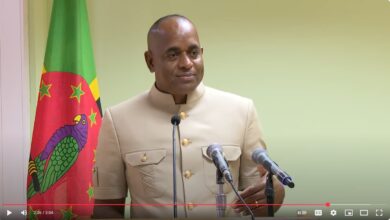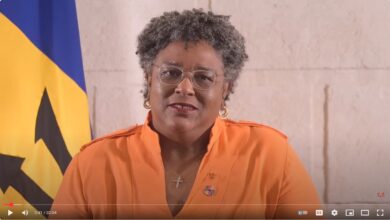Prime Ministers, Ministers, Excellencies, Colleagues in the Public Sector, the Private Sector, the Labour Movement, Consumer Bodies, Non-Governmental Organisations, Bar Associations, Universities, Media from across the Region – Good morning and welcome to this the Second Special Consultation on the CARICOM Single Market and Economy.
It is with considerable anticipation that the Secretariat is participating in the convening of this Second Special Consultation four years after the First was held here in Barbados in 1996. While we have made some progress since then towards the establishment of the CSME since that last Meeting, the rate has been slower than we had hoped, certainly slower than the imperatives surrounding us require.
We are now at the stage in our integration arrangement where implementation is critical and delay is deadly. You might say we have always said this and yet nothing much happens, certainly not enough differently. So what is the difference this time?
This time there are very many imperatives facing us, not least of which is our own track record of slow implementation leaving a back log which has left us further behind than we can ever afford to be with a lot of catching up to do and not sufficient time. In the meanwhile, the world around us is carrying on with its business, demanding that we put ourselves in a position to meet the challenges out there and to take advantage of all opportunities which emerge. Not to do so would mean that we are left further behind with less hope of catching up in any timely manner in the future.
We have only to look at what is happening around us and what is happening at home in the Region. Our traditional exports are under threat as indeed are those overseas.
The response therefore must be to produce and produce more competitively, the same products and new products for our own markets and for export markets. This our Heads of Government recognised in 1989, when they made the Grand Anse Declaration to establish a CARICOM Single Market and Economy (CSME). Developments since then in the Region and internationally, simply make that need even more evident and urgent.
The Region has spent the last seven years from 1993 redrafting the Treaty of Chaguaramas to ensure that the necessary legal framework is in place for the establishment of the CSME. This has been achieved with the completion of nine Protocols, the signing of which is almost completed. These nine Protocols oblige Member States to remove all restrictions on the free movement of goods, services, capital and persons and provide for a single enlarged economic space within which CARICOM nationals have the right to establish businesses in any Member State and have access to all the resources in the Region and all markets in the Region. These Protocols also set out policies and measures for achieving competitive production in the various sectors such as agriculture, industry, tourism, transport and other services. Four of the nine Protocols are being provisionally applied and only one or two countries are still to sign one of the other of the remaining five, leaving only their integration into one revised Treaty to be completed.
During that period also, a number of companion intra-regional agreements have been concluded and/or introduced at the national level such as the Double Taxation Agreement, the Social Security Agreement, the Multilateral Air Services Agreement and the Free Movement of Caribbean Community Skilled Nationals Legislation.
Now is the time for all of these commitments to be translated into implementation. The success of this will affect all of our lives positively and I say positively bearing in mind that our major threats will not come from within CARICOM. They will come from our competitors in the hemisphere and the wider world. There is no doubt that without the CSME working to strengthen our economic performance and making our production more competitive, our net position will be worse than it is today. Therefore we the stakeholders must all be involved in contributing to this implementation . It cannot be business as usual.
Member States certainly would wish to see their development enhanced, the well-being of their peoples more secure and themselves in a better position to meet their external commitments as can result from the increased economic activity and the increased incomes generated through the CSME.
Our Business people in the private sector would wish to be better able to defend their markets at home in the Region and secure and retain their markets abroad in the face of the additional global competition.
Consumers would like to be assured of the quality and reliability of the Regional goods and services they buy.
Our people, whether they are skilled or unskilled would wish to be secure in the knowledge that there are opportunities for employment.
This might appear to be a Herculean task especially in circumstances that are not ideally conducive to speedy action and speedy remedy. Yes, we are seeking to establish a CARICOM Single Market and Economy where there are thirteen sovereign states and no central overarching authority but this is part of the challenge. There is however provision for a central legal authority/tribunal, the Caribbean Court of Justice, to ensure only one interpretation of the Treaty provisions and their application so that at least the settlement of disputes can be transparent and even handed.
Very importantly the potential line of beneficiaries, the private sector, have the responsibility, to themselves if to no one else, to push the process forward. To do so, the private sector needs to know the provisions of the Treaty and recognise the opportunities created by those provisions.
At the Regional level, the agenda and programmes of our research, technology and teaching institutions should be geared to be supportive in enabling Member States individually and the Region as a whole to achieve competitiveness in its various sectors.
Time is not on our side. Our initiatives will only be relevant if they are not overtaken by agreements we make at the hemispheric and global levels. We can no longer afford to take the time we have traditionally been taking to implement. We should not be playing catch up on a fast track. It will put pressure on our resources but as was recently said, we have something of value worth working for. This Consultation is aimed at putting us in a better position to understand the issues and together develop the best policies, measures and mechanisms and approaches for achieving the objectives we have set ourselves. This Consultation must also recognise and agree on the role we each have to play.
The success of the Consultation will be judged by our action here after. It will be judged by whether we are seized with a sense of greater urgency and demonstrate that by proceeding to implement the policies, measures and national legislation so that the opportunities for more competitive production are taken advantage of and can be taken advantage of. Our public education programmes at the national and regional levels must reach all corners and ensure that all are aware.
I therefore, look forward to an active, interactive, productive and successful Consultation.





